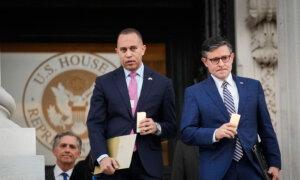In the first weeks, lawmakers will have to elect a speaker and certify the 2024 election. The GOP also wants bills on taxes, border security, and debt.
WASHINGTON—The 119th Congress of the United States will take office on Jan. 3, 2025, and last for two years, until Jan. 3, 2027. Republicans will hold a slim majority in both the Senate and House of Representatives.
With a Republican administration leading the Executive Branch, it is expected that Congress will attempt to enact conservative policies into law.
These efforts will not be unfettered. There is the Senate’s cloture vote requirement—where the support of 60 senators is necessary to overcome a filibuster—as well as divisions in the House Republican Conference amid its single-digit majority.
Key reforms are likely to be enacted using the “budget reconciliation” process, whereby a limited number of bills affecting spending, taxes, and debt can avoid a 60-vote cloture threshold in the Senate, though their effects must be limited to 10 years.
Congress will have several major legislative engagements for the first several months of 2025, which we list below.
Election of a Speaker of the House
The U.S. Constitution requires that the House of Representatives choose a speaker to preside over the body. Customarily, no legislative business is conducted in the House until the Speaker is chosen. The rules of the House vest the speaker with considerable powers.
The speaker, who is usually the leader of the majority party’s conference or caucus, is the highest-ranking member of Congress and is second, behind the Vice President, in the presidential line of succession.
Electing a speaker requires a majority vote of the House, which means that the majority party, if unified, can select him or her. Historically, this was the case, whereby the winner of internal elections in the conference or caucus won unanimous support of their party on the floor.
However, in the 118th Congress, deep divisions in the Republican Conference prevented the election of a speaker—with House Republican Leader Kevin McCarthy winning the gavel after 15 rounds of voting, making it the longest such election since 1859. McCarthy was later ousted in October 2023 due to similar divisions in the Republican Conference.
“I remain undecided, as do a number of my colleagues, because we saw so many of the failures last year that we are concerned,” Rep. Chip Roy (R-Texas) said in a statement to The Epoch Times.
The policy chairman of the House Freedom Caucus, Roy has frequently dissented from the party on fiscal policy legislation implicating the deficit, such as the passage of omnibus government funding bills every year.
Hence, barring significant concessions, it’s questionable whether Johnson can win the speakership on the first ballot, which would re-ignite controversy at the outset of the Congress.
Certification of the 2024 Presidential Election
On Jan. 6, 2025, Congress will convene in a joint session to certify the results of the 2024 presidential election by counting and approving the Electoral College votes of each state. The U.S. Constitution’s 12th Amendment requires this last procedural step.
As her final major act in office, Vice President Kamala Harris, who lost the election to Trump, will preside over the count.
The event will receive heightened security given the events on Jan. 6, 2021, and it has been designated as a National Special Security Event (NSSE) — the highest level of security. This is akin to presidential inaugurations and State of the Union Addresses when all federal leaders convene at one location.
Tax Cuts and Reforms
The biggest policy item that Republicans seek to address is taxation. In 2017, the party passed the Tax Cuts and Jobs Act (TCJA) of 2017, which reduced personal income tax brackets and corporate taxes. It was Trump’s first major legislative accomplishment during his first term.
Additionally, some in the GOP will seek to renew a deal to expand the Child Tax Credit (CTC) negotiated in 2024 by House Ways and Means Committee Chairman Jason Smith (R-Mo.) and Senate Finance Committee Chairman Ron Wyden (D-Ore.).
Republicans have opposed provisions in the deal that would enable illegal immigrant parents of natural-born U.S. citizen children to claim the credit. They also have objected to a “lookback” provision that would allow unemployed parents to claim a credit based on a prior year’s income, which they said would disincentivize them from looking for employment.
Immigration and Border Security
The principal theme of Trump’s 2024 presidential campaign, apart from perhaps the economy, was border security. During the Biden administration, over 7 million foreign nationals illegally crossed the U.S. border with Mexico. Trump, in response, promised to launch the “largest deportation operation in American history” and reform asylum laws that enable illegal immigrants to remain in the country while their asylum claims are being processed.
Some border security initiatives, such as forcing asylum seekers to remain in Mexico while their claims are processed, will not require legislation. However, the funding for mass deportations as well as changes to the asylum process will require Congress to pass new spending and administrative laws.
Most significantly, Trump’s longstanding desire to construct a wall along the length of the southern border will require Congress to approve the funds.
Bills related to spending could be passed without the 60-vote cloture requirement in the Senate using a process known as budget reconciliation. However, changes to immigration and asylum laws will likely be deemed improper in such a bill by the Senate Parliamentarian, whose rulings have often constrained Democrats and Republicans in the past.
The Debt Limit
The U.S. Government’s fiscal stability depends on borrowing new money to service spending as well as repay existing debts. By law, the federal government’s debt nominally cannot exceed $14.29 trillion, though repeated extensions have led the actual sovereign debt to balloon to $36 trillion at present. The last such measure, which suspended the debt limit until Jan. 1, 2025, was the Fiscal Responsibility Act (FRA) of 2023.
Despite its expiration, the U.S. government will not immediately default on its debt and spending obligations on Jan. 1. Temporary measures allowed by statute, as well as currency reserves, will enable the Treasury to meet obligations for several months. However, Congress will need to act in the first few months of 2025 to prevent a default, whose effects on the global economy could be highly negative, given the U.S. dollar’s status as the world reserve currency.
That effort failed after many Republicans, as well as Democrats, objected.
Original News Source Link – Epoch Times
Running For Office? Conservative Campaign Consulting – Election Day Strategies!


